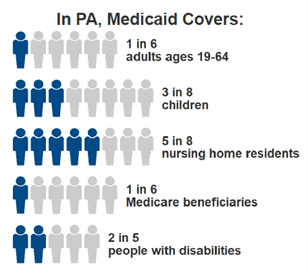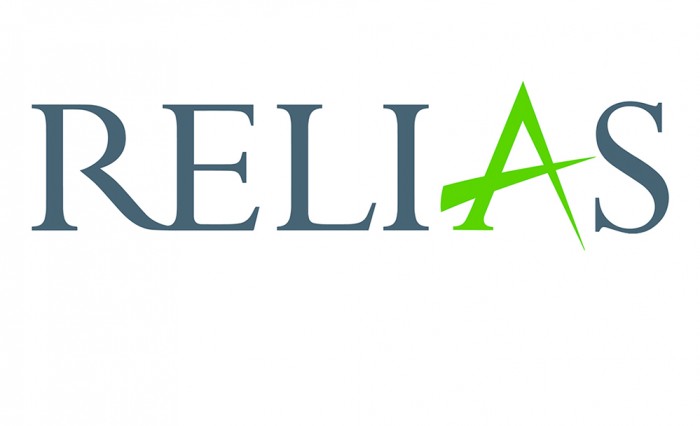Congress’s Plans to Cut Medicaid Spending: Where We Are, What It Means
The Republican-controlled U.S. House adopted a federal budget resolution last week that instructs the House Energy and Commerce Committee, which has jurisdiction over Medicaid, to identify at least $800 billion in mandatory spending cuts during the next 10 years. The resolution is now in the GOP-controlled U.S. Senate.
Medicaid, which is jointly funded by states and the federal government through a federal matching program with no cap, is seen as a prime target for cuts, as it is one of the largest federal programs at a cost of more than $600 billion a year. Approximately 70 million people in the United States receive Medicaid benefits, with about 3 million — including 1.2 million children — of those in Pennsylvania. While officially the federal government did not name Medicaid as the target, there are virtually no other areas to turn to in order to generate such spending cuts.
Proposals being considered in Congress to cut Medicaid are estimated to cost Pennsylvania as much as $2 billion a year. These cuts will inevitably result in:
- Fewer insured Pennsylvanians;
- Fewer covered services for those who remain insured;
- Lower reimbursement rates paid to providers;
- Increases in uncompensated care; and
- Higher healthcare costs for those who are insured.
In addition to broad, negative consequences, each segment of the human services sector will be affected.
Behavioral Health
Medicaid is the largest payer of behavioral healthcare services in the United States, where nearly 40 percent of non-elderly adult Medicaid beneficiaries have a mental health or substance use disorder. Additionally, Medicaid is an essential revenue source for behavioral healthcare organizations. With the potential of fewer covered individuals and lower reimbursement rates, access will be squeezed, with existing providers less incentivized to accept Medicaid patients.
These potential cuts come on the heels of a compromised post-public health emergency unwinding of Medicaid, in which Pennsylvania’s actuarial analysis for the behavioral health capitation was severely underestimated. The eventual Medicaid rolls included more individuals with acute and chronic conditions, resulting in higher levels of care and services. Despite mid-year adjustments to the HealthChoices’s primary contractors, Pennsylvania will start the new fiscal year with the need to increase its BH Medicaid capitation by nearly $640 million.
Intellectual and Developmental Disabilities
Medicaid is the primary funding source for IDD services. If the proposed multi-billion dollar funding cuts occur, Pennsylvania’s intellectual disability system will face serious consequences, including service reductions, longer waitlists, and limited access to essential care. Providers already under strain may have to discharge individuals from community-based services, potentially returning them to institutional settings and undoing decades of progress towards independence and inclusion.
Pediatric Rehabilitation
Medicaid is a key funding source for healthcare and rehabilitation services for infants, children, and adolescents living with disabilities and medical complexity. Even for families with a private primary insurance, Medicaid as a secondary insurance fills in the gaps in covered care. Children with disabilities, regardless of household income, are Medicaid eligible to offset the high costs of care. Medicaid cuts will negatively impact the most vulnerable in our state: children with disabilities and special health needs.
Early Intervention
Medicaid is a supplemental funding source for Early Intervention services in Pennsylvania. All Pennsylvanian families currently enjoy access to these crucial home- and community-based services with no cost-share. Cuts in funding to this program may cause tighter eligibility requirements or cost-shares for families, ultimately decreasing access to essential services.
How the Cuts Might Be Done
Work Requirements
At this point, work requirements appear to be one of the most likely paths to Medicaid cuts.
According to the Pennsylvania Health Access Network (PHAN), approximately 1 million adults in Pennsylvania would be subject to the work requirement.
Medicaid work requirements would require certain Medicaid enrollees to work, look for work, or conduct another qualifying activity (e.g., education, caretaking) as a condition of receiving health insurance. As part of such a requirement, all working age Medicaid enrollees may be required on a monthly basis to report their work or verify their eligibility for an exemption because they are in school or a job training program, caring for others, or disabled/in treatment. Failure to do so would result in them losing Medicaid coverage.
On the surface, increasing support for work requirements is understandable. Able-bodied citizens on Medicaid who can work, should work. What is not being discussed is the fact that most of these individuals are already working but at an income that still qualifies them for Medicaid. Further, studies from states that have attempted to implement a Medicaid work requirement show that the cost to the state to implement and administer such a requirement is in the tens of millions of dollars.
If work requirements become a reality, advocates must lobby for waivers for special populations.
Federal Medical Assistance Percentage (FMAP)
At this point, according to Speaker of the U.S. House Mike Johnson, FMAP (as well as per-capita caps, see below) are not a consideration for reducing Medicaid spending.
Each state’s FMAP determines its federal share of Medicaid funding. FMAP is a formula that uses the state’s most recent three-year average per capita income data to provide higher matching rates to states with lower per capita incomes relative to the national average. FMAPs have a statutory minimum of 50 percent and a maximum of 83 percent.
In Pennsylvania, 56 percent of Medicaid costs are paid with federal dollars, leaving Pennsylvania to cover the balance.
Under the Affordable Care Act’s Medicaid Expansion, the FMAP for what became the newly eligible population — mostly low wage workers who do not have coverage through an employer, disabled workers, caregivers to children or elderly family members, and students — is fixed at 90 percent federal funding, with the commonwealth paying for the balance.
Per Capita Caps
A per capita cap funding arrangement sets an upper limit on federal payments per Medicaid enrollee in each eligibility group. In an aggregated cap (also called a capped allotment) approach, states receive federal matching funds up to a determined maximum. If the cap is exceeded, the state bears 100 percent of that cost with no federal match.
Resources
There are many resources continually being developed and distributed. These include ways to take immediate action with Congress. The following are some of the most relevant to our membership.
- ANCOR Action Alert
- Kaiser Family Foundation Pennsylvania Medicaid Fact Sheet
- Legal Action Center/Coalition for Whole Health Protect Medicaid Report
- National Association for Behavioral Healthcare: Medicaid Policy Proposals Analysis
- National Council for Mental Wellbeing Take Action
- Pennsylvania Health Access Network Medicaid Resource, Including Congressional District Fact Sheets
Next Steps
RCPA will continue to closely monitor the issue. As Congress’s next steps become clearer, we will work with our partners, including you, to develop and execute strategies to stop Medicaid cuts or minimize the negative effects.
Contact your respective RCPA Policy Director with questions.
Network and Showcase Your Organization at the 2025 RCPA Conference Striving to Thrive!
Get in on the action and network with providers by sponsoring, exhibiting, and advertising at the 2025 Annual Conference Striving to Thrive September 9 – 12 at Hershey Lodge. The event is a highlight for the Pennsylvania behavioral health, brain injury, children’s, intellectual and developmental disabilities, medical rehabilitation, and physical disabilities and aging provider communities. This year’s event features new opportunities to participate. Booth self-selection will also be available for exhibitors and exhibiting sponsors. In order to be considered for self-selection, a completed contract with payment must be submitted.
Network and Compete in Connections Hall
Connections Hall activities take place during the two busiest days of the conference, and many networking opportunities are available throughout the event. You’ll also be able to compete and have a chance to win “Best of Show!”
Exciting New Sponsorship Opportunities
RCPA is privileged to have the backing of the finest organizations in the field for our conference. Through the use of sponsorship circles, RCPA is able to honor all supporting organizations.
Sign Up Now!
Sponsors, exhibitors, and advertisers who wish to be listed on the website, the mobile app, and in the conference program must submit all materials by August 20.
The association looks forward to welcoming you at the conference! Space and opportunities are reserved on a first-come, first-served basis, and no reservation is considered complete without payment. If questions remain, please contact Carol Ferenz, Conference Coordinator.
State Representative Dan Miller to Host “The Defense of Medicaid” Press Conference Feb. 28

Message from Representative Dan Miller’s Office:
Supporting and defending Medicaid funding to our Commonwealth has always been a top priority of mine, and this week we’re having a press conference to discuss the potential impact that Federal cuts to Medicaid may have on our most vulnerable populations.
Joining me will be U.S. Reps. Chris Deluzio and Summer Lee, other state lawmakers, and Allegheny County officials to highlight why defending Medicaid is imperative. We will also hear from self-advocates who would be directly impacted by Medicaid changes.
 The loss of Federal funding to states would be devasting for the more than 3 million Pennsylvanians who are enrolled in Medicaid. Medicaid also pays for 30% of Medicare. Those that depend on its supports and services, include:
The loss of Federal funding to states would be devasting for the more than 3 million Pennsylvanians who are enrolled in Medicaid. Medicaid also pays for 30% of Medicare. Those that depend on its supports and services, include:
- Seniors
- Low-income families and individuals
- People with disabilities
- Pregnant women and children, and many more.
The news conference will be held at 10:15 am Friday, February 28, at the Portico of the City-County Building, 414 Grant St., Pittsburgh.
We’ll also be joined by state Reps. Dan Frankel, Emily Kinkead, Jess Benham, Lindsay Powell, Aerion Abney, La’Tasha D. Mayes and Arvind Venkat; state Sens. Jay Costa, Wayne Fontana, Lindsey Williams and Nick Pisciottano; Mayor Ed Gainey; Allegheny County Controller Corey O’Connor; Pittsburgh Councilwoman Erika Strassburger; and the offices of County Executive Sara Innamorato and U.S. Sen. John Fetterman.
There is a lot to be discussed, and everyone is welcome to join us this Friday at 10:15 am at the Portico of the City-County Building located at 414 Grant Street in downtown Pittsburgh.
As always, if you have questions about this event or any state-related matter, please contact our office at 412-343-3870 or [email protected].
|
|
Reminder for RCPA 2025 Conference Call for Proposals!
This is a reminder that the Call for Proposals for the 2025 RCPA Annual Conference Striving to Thrive will be closing Friday, March 14. Striving to Thrive will be held September 9 – 12 at the Hershey Lodge for a statewide audience, and the Conference Committee is seeking workshop proposals in every area for possible inclusion, particularly those that assist providers in developing and maintaining high-quality, stable, and effective treatments, services, and agencies in an industry where change is constant. The committee looks for presentations that:
- Provide guidance on building a culture of a committed workforce, including recruitment and employee development as well as effective remote workforce strategies;
- Inspire ideas for organizations to be leaders in their field;
- Highlight new policy, research, and treatment initiatives, such as the use of artificial intelligence and use of technology in service provision;
- Provide specific skills and information related to individual and organizational leadership development and enhancement;
- Discuss advanced ethics practices and suicide prevention;
- Address system changes that affect business practices, including integrated care strategies, value-based purchasing, performance-based contracting, acquisitions and mergers, and alternative payment models; and
- Discuss organization strategies to adapt to performance-based contracting.
The committee welcomes any proposal that addresses these and other topics essential to rehabilitation, mental health, substance use disorder, children’s health, aging, physical disabilities, and intellectual/developmental disabilities & autism.
Members are encouraged to consider submitting, and we highly encourage you to forward this opportunity to those who are exceptionally good speakers and have state-of-the-art information to share.
The Call for Proposals (featuring a complete listing of focus tracks) and accompanying Guidelines for Developing Educational Objectives detail requirements for submissions. The deadline for submissions is Friday, March 14, 2025, at 5:00 pm. Proposals must be submitted electronically on the form provided; confirmation of receipt will be sent. Proposals submitted after the deadline may not be considered.
If the proposal is accepted, individuals must be prepared to present on any day of the conference. Workshops are 90 or 180 minutes in length. At the time of acceptance, presenters will be required to confirm the ability to submit workshop handouts electronically two weeks prior to the conference. Individuals unable to meet this expectation should not submit proposals for consideration.
Individuals are welcome to submit multiple proposals. Notification of inclusion for the conference will be made via email by Friday, May 9, 2025. Questions may be directed to Carol Ferenz, Conference Coordinator.
DHS Proposed 2025/26 Budget Webinar Materials Now Available
Secretary Val Arkoosh and leadership from the Department of Human Services (DHS) hosted a webinar to discuss the proposed 2025/26 budget for the Department on Friday, February 7, 2025.
The recording is available here, and the PowerPoint has been made available.
RCPA will continue to update members on the budget as information becomes available. If you have further questions, please contact your RCPA Policy Director.
Secretary Arkoosh Reviews 2025/26 DHS Budget
The Department of Human Services (DHS) Secretary Val Arkoosh met with systems stakeholders to provide an overview of the Governor’s proposed 2025/26 DHS budget. The Secretary began by reviewing the accomplishments of DHS under the administration and highlighted areas around Medicaid, systems enhancements, and the expansion in the delivery of services to Pennsylvanians.
The projected spending across DHS showed an investment of $21.17B, with the following breakdowns:
- $7.13B for Long-Term Living;
- $6.4B for Medicaid/healthcare delivery;
- $3.22B for ID/A;
- $1.72B for Human Services and County Child Welfare; and
- $1.04B for Mental Health and Substance Use Disorders.
This budget number represents a $1.95B increase over last year’s executive budget. The most significant increases included:
- $927M for Long-Term Living;
- $7.23M for Medicaid/healthcare delivery;
- $1.84M for ID/A;
- $74M for Child Development; and
- $32M for Mental Health and Substance Use Disorders.
RCPA submitted questions during the webinar in an effort to gain greater clarity on the proposed $2.4B increase in the Health Choices capitation. Several questions remain unanswered, including:
- Are these dollars allocated towards physical health, behavioral health, or both?
- What is the spending strategy for the 2024/25 supplemental appropriations? Is that part of the $2.4B?
There was clarification on the proposed $170M increase in the ID/A budget, but Secretary Arkoosh stipulated that this was not new investments but rather funds to sustain last year’s increase.
The remainder of the webinar was spent outlining current DHS initiatives, including the Keystones of Health 1115 Waiver, which was approved in December 2024. This year’s priority will focus on reentry services as well as planning for future implementation. The Secretary concluded her comments supporting the minimum wage increase, reinforcing the workforce infrastructure, and tackling Commonwealth-wide challenges.
The DHS Bluebook is scheduled for release in the coming weeks and will provide line item details of the budget. RCPA will continue to work with DHS and PA legislators on the budget specifics and our ongoing advocacy efforts. You can view the DHS budget webinar here.
RCPA will continue to update members on the budget as information becomes available. If you have further questions, please contact your RCPA Policy Director.
Sponsor, Exhibit, and Advertise at the 2025 RCPA Conference Striving to Thrive!
Join RCPA as we host the 2025 Annual Conference Striving to Thrive from September 9 – 12 at the Hershey Lodge. The event is a highlight for the Pennsylvania behavioral health, brain injury, children’s, intellectual and developmental disabilities, medical rehabilitation, and physical disabilities and aging provider communities. RCPA staff and the Conference Committee are excited to release this year’s Sponsors, Exhibitors, and Advertiser Brochure, which features new opportunities to get in on the action and network with providers. Booth self-selection will also be available for exhibitors and exhibiting sponsors. In order to be considered for self-selection, a completed contract with payment must be submitted.
Network and Compete in Connections Hall
Connections Hall activities take place during the two busiest days of the conference, and many networking opportunities are available throughout the event. You’ll also be able to compete and have a chance to win “Best of Show!”
Exciting New Sponsorship Opportunities
RCPA is privileged to have the backing of the finest organizations in the field for our conference. Through the use of sponsorship circles, RCPA is able to honor all supporting organizations.
Sign Up Now!
Sponsors, exhibitors, and advertisers who wish to be listed on the website, the mobile app, and in the conference program must submit all materials by August 20.
The association looks forward to welcoming you at the conference! Space and opportunities are reserved on a first-come, first-served basis, and no reservation is considered complete without payment. If questions remain, please contact Carol Ferenz, Conference Coordinator.
IPRC Member Good Shepherd Rehabilitation to Host DISRUPT: Health-Care Innovation Summit on April 5
Second Federal Judge Issues Temporary Restraining Order
Message from ANCOR:
A second federal judge has blocked the freeze on federal spending noticed earlier in the week through a memo from OMB.
The order directs the Trump Administration not to “pause, freeze, impede, block, cancel, or terminate defendants’ compliance with awards and obligations to provide federal financial assistance to the states, and defendants shall not impede the states’ access to such awards and obligations” until further arguments can be heard.
The order does not prevent the review of federal programs, only the freeze on federal spending during the review. The OMB memo was rescinded prior to the issuance of the order, but the judge expressed earlier in the week that he was not persuaded that withdrawing the memo removed the underlying harm.
A hearing is expected Monday on the previous restraining order issued earlier in the week. We’ll keep you posted as we learn more.
Lydia Dawson, JD
ANCOR | Vice President of Government Relations
571-932-5375
















